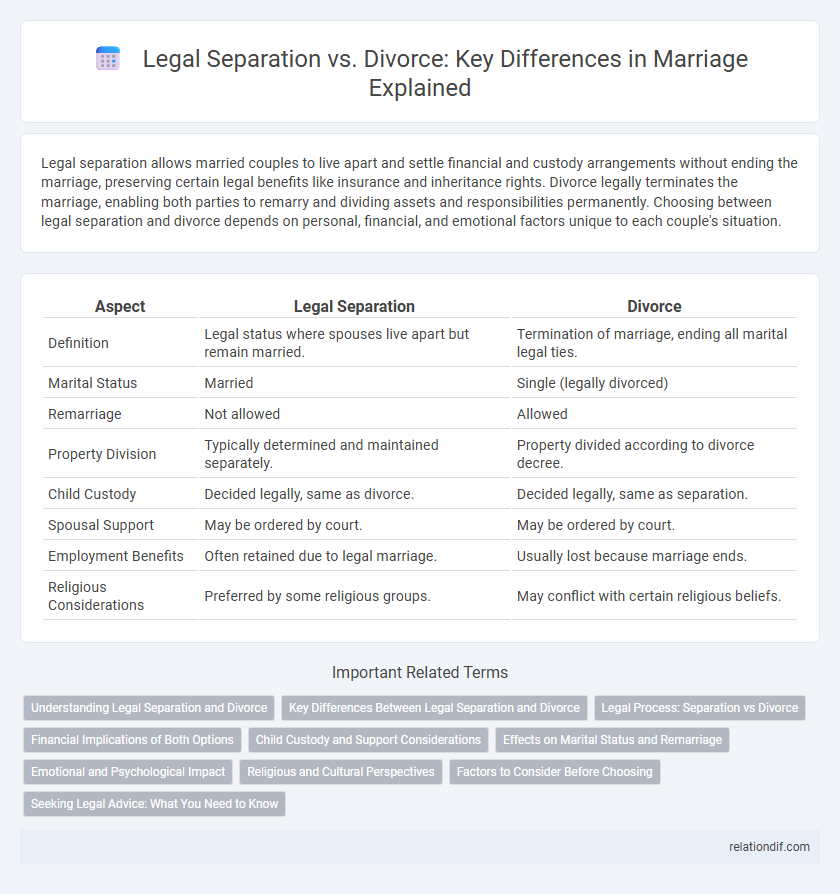Legal separation allows married couples to live apart and settle financial and custody arrangements without ending the marriage, preserving certain legal benefits like insurance and inheritance rights. Divorce legally terminates the marriage, enabling both parties to remarry and dividing assets and responsibilities permanently. Choosing between legal separation and divorce depends on personal, financial, and emotional factors unique to each couple's situation.
Table of Comparison
| Aspect | Legal Separation | Divorce |
|---|---|---|
| Definition | Legal status where spouses live apart but remain married. | Termination of marriage, ending all marital legal ties. |
| Marital Status | Married | Single (legally divorced) |
| Remarriage | Not allowed | Allowed |
| Property Division | Typically determined and maintained separately. | Property divided according to divorce decree. |
| Child Custody | Decided legally, same as divorce. | Decided legally, same as separation. |
| Spousal Support | May be ordered by court. | May be ordered by court. |
| Employment Benefits | Often retained due to legal marriage. | Usually lost because marriage ends. |
| Religious Considerations | Preferred by some religious groups. | May conflict with certain religious beliefs. |
Understanding Legal Separation and Divorce
Legal separation allows married couples to live apart while remaining legally married, managing issues like property division, child custody, and spousal support without ending the marriage. Divorce legally terminates the marriage, dissolving all marital obligations and allowing both parties to remarry. Understanding the differences between these legal processes helps couples make informed decisions based on their financial, emotional, and familial needs.
Key Differences Between Legal Separation and Divorce
Legal separation allows couples to live apart and resolve financial or child custody issues without dissolving the marriage, maintaining legal rights such as spousal benefits and inheritance. Divorce legally terminates the marriage, freeing both parties to remarry and requiring division of assets, alimony, and child custody arrangements to be finalized. Legal separation may be preferred for religious or financial reasons, whereas divorce provides a permanent end to the marital relationship.
Legal Process: Separation vs Divorce
Legal separation involves a court-approved agreement that outlines the rights and responsibilities of spouses without dissolving the marriage, allowing couples to live apart while remaining legally married. Divorce is a formal legal process that terminates the marriage, requiring court intervention to address asset division, child custody, and support arrangements. The separation process typically requires filing a petition for legal separation, while divorce demands a petition for dissolution of marriage, both subject to state-specific procedural rules and timelines.
Financial Implications of Both Options
Legal separation allows couples to live apart while maintaining certain legal benefits, such as tax advantages and access to health insurance, often leading to less immediate financial disruption compared to divorce. Divorce results in the dissolution of the marriage and requires division of assets, spousal support, and potential child support, which can have significant long-term financial consequences. Choosing between legal separation and divorce impacts credit scores, retirement benefits, and eligibility for government assistance programs, making it crucial to understand the distinct financial outcomes of each.
Child Custody and Support Considerations
Legal separation allows couples to live apart while remaining legally married, impacting child custody arrangements and support obligations differently than divorce. In both cases, courts prioritize the child's best interests when determining custody, often awarding joint or sole custody based on parental fitness, stability, and the child's needs. Child support is mandated to ensure the child's financial welfare, with payments continuing until the child reaches the age of majority or other specified conditions; legal separation may affect the timing and terms of support differently compared to finalizing a divorce.
Effects on Marital Status and Remarriage
Legal separation allows spouses to live apart without terminating the marriage, so their marital status remains legally married and they cannot remarry. Divorce legally ends the marriage, changing the marital status to single or divorced, which permits individuals to remarry. Understanding these distinctions is crucial for individuals considering remarriage and the legal implications of their decisions.
Emotional and Psychological Impact
Legal separation often allows couples to live apart while still maintaining some legal ties, which can provide emotional stability and reduce psychological stress during transition periods. Divorce, however, typically involves a complete dissolution of the marital relationship, leading to significant emotional upheaval, grief, and identity restructuring. The psychological impact of divorce can include increased anxiety, depression, and a challenging adjustment period compared to the often less definitive emotional state during legal separation.
Religious and Cultural Perspectives
Legal separation allows married couples to live apart without dissolving the marriage, accommodating religious doctrines that prohibit divorce, such as in Catholicism and Islam. Divorce, however, is accepted in many cultures for irreconcilable differences, though its social stigma varies widely, influencing family dynamics and community relationships. Understanding these perspectives is essential for navigating marital issues within diverse religious and cultural frameworks.
Factors to Consider Before Choosing
Legal separation allows couples to live apart while remaining legally married, often preferred for religious, financial, or health insurance reasons. Divorce dissolves the marriage entirely, affecting property division, custody arrangements, and spousal support more definitively. Key factors to consider include the impact on taxes, eligibility for benefits, emotional readiness, and long-term financial security.
Seeking Legal Advice: What You Need to Know
Seeking legal advice is crucial when considering legal separation or divorce to understand the specific rights, obligations, and financial implications under family law. Consulting a qualified family attorney ensures clarity on asset division, child custody, spousal support, and the legal process involved. Early legal guidance helps protect your interests and facilitates informed decision-making tailored to your unique marriage circumstances.
Legal Separation vs Divorce Infographic

 relationdif.com
relationdif.com